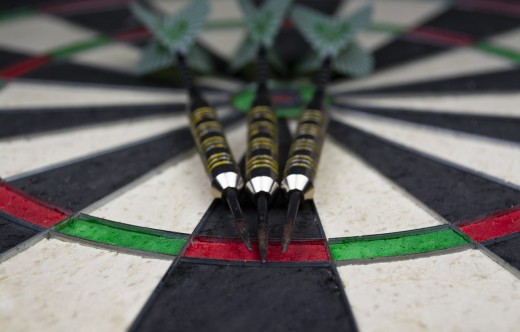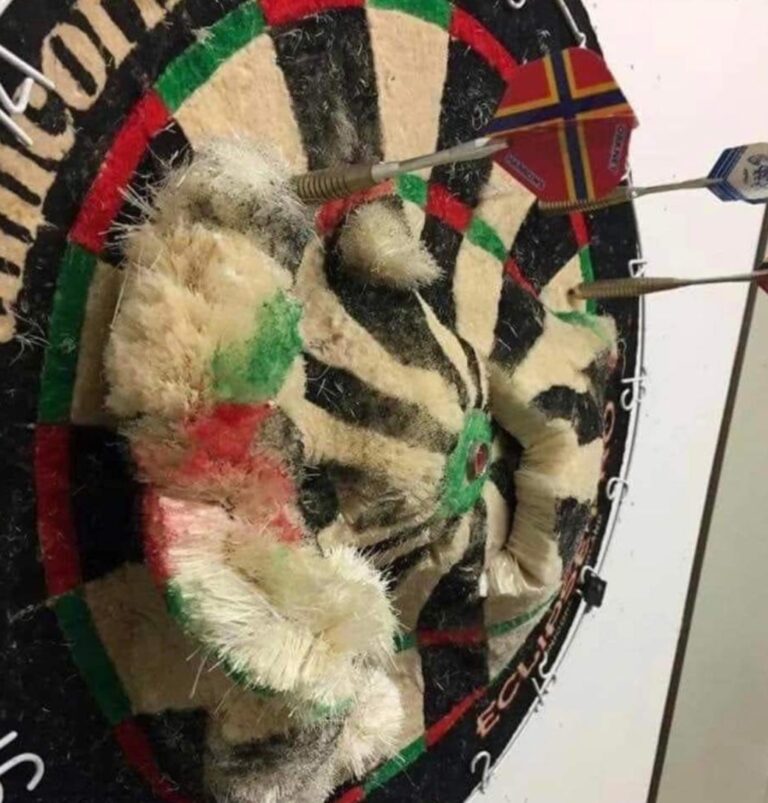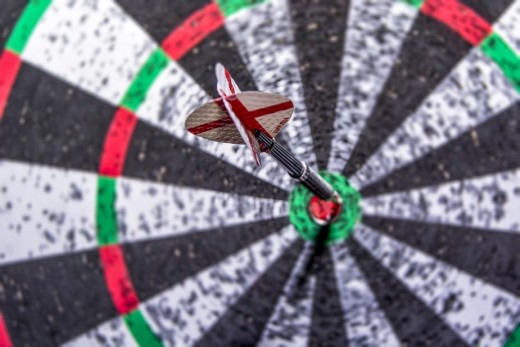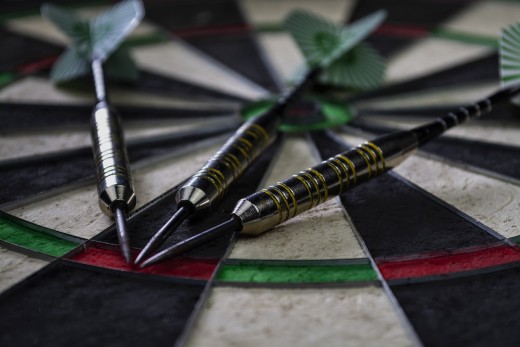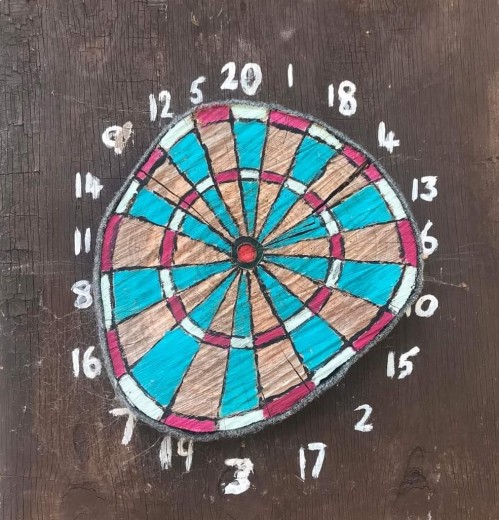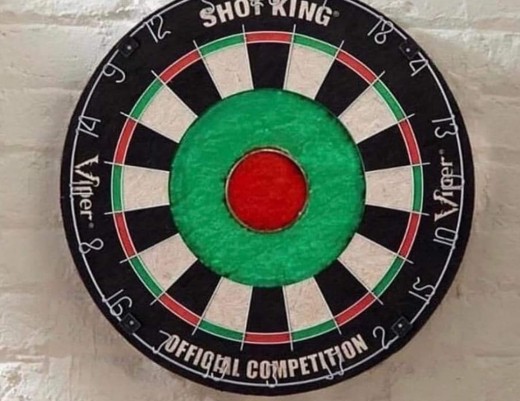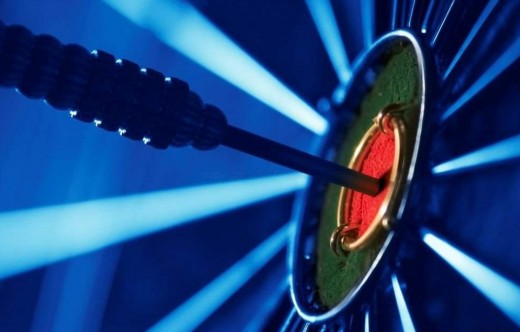Tuesday, December 11, 2018
Column 567
The Ultimate Darts Advantage
With the World Championship just days away and then the Pee Wee World Championship to follow at Lakeside, when one considers the lengths to which a darter will go when searching for something – anything, including farts – to give themselves an advantage, it is downright mysterious that one of the most critical aspects of the game has, so far, escaped special scrutiny.
Anyone who knows anything about the sport of darts knows how important winning the toss of the coin can be. It determines who gets to throw for bull first. And winning the bull determines who steps to the line first. He or she who throws first has a distinct advantage.
Anyone who has confidence in their shot at cork but has had their shot for cork – and thus, their opportunity to shoot first – blocked by the dart of an opponent “lucky” enough to win the toss of the coin, knows the feeling of starting at a disadvantage. Anyone who has then watched their opponent win the cork and quickly chalk up a maximum or, in the case of cricket, close 20s, 19s and 18s, has experienced that truly sinking feeling of an imminent loss. But at this moment, never – not ever – do any of us relate our dilemma back to the root cause: our loss of the toss of the coin.
Oh, I know, the scenarios I’ve just described are ones from which a good player can recover. Responding with a 180 or closing 17s, 16s and 15s (or perhaps pounding nine 17s) could change the complexion of things. My point is only, as we all know, that stepping to the line first is an advantage. And it all begins with the toss of the coin. No two ways about it. And, besides, under pressure not a whole lot of us can come back with a 180 (more likely a couple of t1s and a t5) or close the next three numbers in cricket or punch the 17s nine times (perhaps the 2s or the 3s, but not 17s). This, of course, has to do with the finer points of the space-time continuum.
Along the way, all sorts of technical innovations have been researched, tested and then adopted in our sport and each and every one of them was driven by the desire of the darter to find that “extra edge” to help them win more often. Just as in golf, with the evolution from persimmon to graphite – from puny wooden drivers to powerful, error correcting, Big Berthas – science has stepped into our sport to find ways to improve individual performance and to, some of the time, lessen the gap between recreational darters and those of substantial skill.
Retractable points were once popular in reducing the incidence of bounce outs. High titanium alloy barrels enhance the likelihood for tighter groupings. We have all sorts of special flights to provide various aerodynamic advantages. Dimples offer lift. Ribs reduce side to side sway and turn on the ladies.
We practice for endless hours. We work to perfect our stance. Our set. Our release. Our follow through. We talk strategy. Some darters practice breathing. Others read books on Zen and how to block out distractions. Some darters I know use special “aiming fluids,” ostensibly to reduce stress and improve hand-to-eye coordination.
But we don’t do diddly to increase our chances of winning the toss of the coin. Just go back to the record books and see how many Super Bowl teams have elected to kick off when they had the opportunity to receive.
I’ve done this research and I can tell you that the correlation between calling heads or tails correctly and winning the granddaddy of all football games is statistically significant. Same thing in college football, unless you’re the University of Michigan.
People WANT to win the toss of the coin.
Now, I know what you’re thinking. But just because Einstein or Copernicus or whoever it was flipped a coin two billion times and declared that, when replicated by 300-pound fat boys with helmets and big double zeros on their shirts, it will land an equal number of times on each side – does NOT mean it is so. I have also done this research. Just the other night I flipped a quarter two billion times while waiting for a couple of “C” league shooters to take out the d1. The quarter did NOT land on heads and tails an equal number of times, though twice it landed in my beer.
But this isn’t the point anyway. We don’t have to guess heads or tails correctly 50 percent of two billion times. We only have to get it right ONCE. This completely changes the calculus. If you have paid close attention to how you have fared in coin tosses over the years you already know that this is so.
I was in third grade the first time a flip of the coin effected a key moment in my life. My buddy Butch Kirk and I tossed one of those Kennedy fifty-cent pieces, that have since disappeared from the planet, to decide who’d have to steal one of their father’s Playboys to take down to our fort in the woods. I called heads. I lost. I remember this, though I don’t remember it quite so distinctly as I do being caught by my mother and then grounded for a month from watching the Jetsons on Saturday morning. “But Mom, I thought my baseball rolled under the bed.”
The next significant coin toss of my life took place on Halloween night during my junior year of high school. My best friend, John Jarrard, and I had already decided that a cherry bomb just had to be set off inside Billy G. Thompson’s porch light. I called heads. I lost. And Billy, our assistant principal, kicked me out of school the next morning. “Well, Dad, what I ‘was thinking’ was…”
I could go on. The coin toss loss which determined that I, not my college roommate, Bob Quigley, would be the first from French Hall to streak past the girls’ dorm next door at Western Michigan University… and the first of our group to peel down for a dip in the campus fountain. “It’s good to see you again too, officer… and, yes, I suppose I really should learn to keep my pants on in public.”
For damn near 65 years now I have been calling heads. I haven’t a clue why. It’s just one of the things we do over and over again, the same way we go mindlessly about other routines in life. I’ve been calling heads just because the very first time I had to decide between heads and tails, I picked heads. No reason. No sense to it. In fact, considering that to the best of my recollection I haven’t EVER won a coin toss, this blind allegiance to routine has been just plain stupid.
Some people call tails. And the same damn thing happens. They’re stupid too.
And this brings me to the point of this column. Think about it.
You may not be like me. Perhaps you never even watched the Jetsons? Perhaps you’ve never seen Playboy? Perhaps you’ve never been caught in a compromising position? Possibly even, you’ve never hit the t1 or t5 when needing to fill the t20 to catch up and break throw.
The fact is we all have a lot in common and at the top of the list is that we all LOSE the toss of the coin more than we WIN the toss of the coin, but we keep calling the same side of the coin over and over and over again.
We’re ALL stupid – we ALL have double zeros on our backs.
We can all be winners if we just call the OTHER SIDE OF THE COIN. Duh. On the other hand, if you are playing me, I might not switch. Or maybe I will.
I hope this advice on the finer side of the critical toss of the coin will give you the edge necessary to be more competitive and win more often, regardless of the level of your darts play. Otherwise, just fart.
Be sure to read this column next month when I will expose the grand Russian conspiracy to horde America’s Kennedy fifty-cent pieces and tell you what this may mean for the future of the soft-tip side of our sport.
From the Field,
Dartoid

